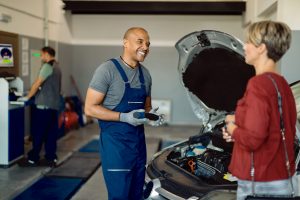The following article was written by Mike Skoropad. Mike is the co-founder of car technician and tire retailer UNITED TIRES.
The auto repair industry has long had an image problem. A 2016 survey found that 66% of US drivers do not trust auto repair shops, with these findings being corroborated by consumer surveys conducted in 2010 and 2021.
consumer surveys conducted in 2010 and 2021.
The study identified 5 key findings. These are:
- 50% of respondents are worried that auto repair work will not be done correctly.
- 73% of respondents are worried about being overcharged for repairs.
- 76% of respondents feel that auto-repair shops are likely to recommend unnecessary services to make more money
- 63% of respondents attribute their distrust auto-repair professionals to a negative past experience
- People aged under 40 are 2.5 times more likely to hold such distrust towards the auto-repair industry compared to older drivers.
With these findings in mind, here are the ways that auto-repair businesses can build trust in their existing and potential customers in a way that specifically remedies the problems identified in the study.
Allow the option of free follow up inspections
Given that half of all US drivers are worried that auto repair work will not be carried out correctly, auto-repair shops should offer their customers some sort of guarantee or insurance if a problem persists after the initial repair.
Drivers have likely lost faith in auto-repair professionals’ ability to fix problems correctly due to service providers previously having over-promised and under-delivered, only to try and charge again when customers ask to get a problem relooked at.
 Offering customers a free follow-up if a problem persists within a certain time frame of the initial repair has the double effect of making your shops’ staff “put their money where there mouth is”, as well as offering customers piece of mind that they will not have to pay again if their car were to fail in the same way in the near future.
Offering customers a free follow-up if a problem persists within a certain time frame of the initial repair has the double effect of making your shops’ staff “put their money where there mouth is”, as well as offering customers piece of mind that they will not have to pay again if their car were to fail in the same way in the near future.
Encourage customers to get a second opinion from other auto-repair shops
It can be hard to fight the general publics’ prejudice against auto repair professionals as over-chargers when only we understand that the cheapest repair is generally not the best repair, and will often end up costing drivers more in the long run.
It can be hard, often impossible, to educate customers about this. However, we need to respect that car repairs often come as unplanned expenses and therefore drivers may not be in a financial position to have the optimal repairs done.
You can build trust with potential customers by both giving them more than one option (ideally at more than one price point) when it comes to possible repairs, and by encouraging customers to get a second opinion from other shops.
Encouraging customers to get a second opinion not only demonstrates transparency and confidence in the advice that your business is offering, but if other shops corroborate what you say then this will only make you seem more trustworthy. This should lead to more customers returning in the long run.
Focus on building a relationship before recommending additional services
While we often recommend additional services because we know that it will prevent larger issues down the line, the average driver will not see it this way. Rather, they will see these recommendations as an attempt to wring more money out of them while you can.
these recommendations as an attempt to wring more money out of them while you can.
It’s understandable why a first-time customer may be skeptical in this way.
A new customer has no obvious reason to believe that you have their best interests at heart. You have expertise that they require, but do not have themselves. Therefore, you are in a position to take advantage of them.
Without a track record of providing a quality service, customers’ guards will always be up to the possibility of this happening.
Only after you have built up some rapport and confidence with customers can you start recommending services beyond what they immediately need.
Chances are, customers will never have the technical understanding to really know why these services are beneficial in the long-term, so this trust is required before you try and recommend anything further.
Don’t be afraid to spoon feed customers
Given that 63% of US drivers reported having a bad experience when dealing with an auto-repair shop, needing to get a vehicle repaired often leads to feeling of anxiety.
One of the biggest reasons behind this anxiety is that many people are painfully aware of how little they understand about their vehicle. Well this does not impact their everyday driving, when something goes wrong, this lack of knowledge is thrown under the spotlight.
No one likes admitting when they don’t know or understand something. Customers will want a basic understanding of what they are paying for, even if they are too embarrassed to ask you for it.
 We can get our staff to ease customers’ feelings of anxiety through explaining, in as lay terms as possible, exactly what they are going to do to their car. Some way that we help ease customers’ concerns include:
We can get our staff to ease customers’ feelings of anxiety through explaining, in as lay terms as possible, exactly what they are going to do to their car. Some way that we help ease customers’ concerns include:
- Using color coded diagrams to illustrate what is not working and how we can fix it.
- Calling customers up, quoting them, and getting them to agree to this quote, before we start our work.
- Always explain what the most cost effective workable solution is, as well as what solution you would recommend and why.
Develop your shop’s online presence to build trust in younger drivers
Online content has given auto shops the opportunity to engage with and earn the trust of younger drivers. Some of the ways that we have successfully been doing this include:
- Trying to get as many positive Google reviews as possible
- Looking at commonly asked questions in car maintenance related subreddits (r/mechanicadvice) is the best one for this, and creating detailed answers in our blog.
- Creating “how-to” videos for basic maintenance like changing a tire and posting them on YouTube.
- Running free giveaways for our local community – this is an example of such an offer.
The basic philosophy with building trust online is that we want to be providing enough useful information to people for free that they already feel like they have gotten significant value from us even before they pay (or even meet) us.
Turning the tide is not easy
Unfortunately, because of current perceptions, we need to work twice as hard at the customer service side of our offering compared to most businesses.
The positive of this is that nailing this can give us a tremendous competitive advantage over competitors who do not put in the work to win trust from potential customers.

This article was written by Mike Skoropad. Mike is the co-founder of car technician and tire retailer UNITED TIRES.






